Class Is In Session
Welcome to our news series, Club Building 101. As with everything we do at Plugged In Golf, our goal is to bring you the best information in a clear, easy to digest format. We’ve partnered with Club Champion – specifically Nick Sherburne, Club Champion’s Founder and Dean of Club Champion University – to cut through all the bad information and bring you the simple truth about how to build your own golf clubs.
Each installment in this series will look at one piece of the club building puzzle in detail so that it’s accessible to even complete novices. We start our journey with the most basic operation: installing a grip.
Tools & Supplies You Need
Double-Sided Tape
Solvent or Mineral Spirits
Vise or Clamp
Knife for grip removal
Tools You Want
Tape Dispenser
Spray Bottle for solvent
Solvent Catch Tray
Hair Dryer or Torch for tape removal
The Process
Step 1: Removing the old grip. If you’re gripping a clean shaft, please skip to Step 3. To remove the old grip, insert your knife – preferably a hook blade – at the bottom of the grip and cut toward the grip cap. Always cut away from yourself! It is much safer to put the club in a vise before cutting the grip. If you’re removing a grip from a graphite shaft, use a light touch so you don’t damage the shaft.
Step 2: Removing the old tape. You can do this with brute force and elbow grease, but the tape will come off more easily if you heat it with a hair dryer or torch first. Make sure to clean the shaft thoroughly so your new grip goes on evenly.
Step 3: Mark the shaft. This step will ensure that the grip doesn’t get stretched or under-installed. With the club in the vise, lay the grip alongside it and mark the shaft near where the grip should end. This will give you a reference point for correct installation.
Step 4: Install double-sided tape. Pull out a length of tape slightly longer than the grip. This is the step where having a quality tape dispenser makes all the difference. Align the tape with the mark on the shaft and smooth it down. You can see in the video that Nick twists the excess tape and cuts it off, but you can stick it in the shaft if you prefer.
Step 5: Apply solvent. Put a finger over the hole in the grip’s butt cap and fill the grip with solvent. Cover the other side of the grip with another finger, and shake the grip to coat the inside thoroughly. Aim the butt of the grip at the tape and remove your fingers from the openings, covering the tape in solvent. Make sure you’re working over a tray or trash can to catch the excess solvent.
Step 6: Install the grip. Put the grip over the butt of the shaft and slide it on. If you used adequate solvent, you don’t need to rush, but you should work quickly. Once the grip is installed to the proper length, check the alignment against the club face. You can also use a straightedge (even a piece of paper will work) to make sure the grip isn’t twisted. Most grips have marks at either end – they should be in a straight line.
Putter Grip Installation: Installing a putter grip follows the same steps as installing a regular golf grip. The only difference is that alignment is more important because of the flat surfaces on the grip. To give yourself the best chance at a perfect installation, make sure your putter face is square when you clamp it. You can use that and the putter’s sight line to align your grip.
Alternate Methods
Grips can be installed with an air compressor and grip attachment. Nick does not recommend this for most grips, citing PURE Grips as the one exception.
The advantage of using air is that you do not need double-sided tape or solvent, so the process is a bit neater. If you watch videos of installations with air, they look extremely easy, but Nick advises the process is more difficult than it looks and requires practice.
Common Mistakes
Nick highlighted four common mistakes. First – shockingly – is using gasoline as a solvent. This is obviously very dangerous.
The second error is lining up grips poorly. This may not affect performance, but there’s no reason not to do the job well.
Another common problem is not removing the old tape thoroughly before installing a new grip. This can make the new grip uneven in your hands.
Finally, make sure that you’re not stretching your grips or not installing them at full length. You can avoid these issues by measuring your tape or marking the shaft, as described above.
Pro Tips
If you’re installing a grip on a shaft without a club head, stick an awl or small screwdriver through the hole in the butt cap once the grip is on. This will punch a hole in the tape and prevent any issues when installing the head.
Next, if you’re going to recycle your grip solvent, make sure to filter it. Nick recommends using a coffee filter to get the bits of rubber and dust out.
Finally, sliding a grip on quickly looks like a pro move, but Nick warns that it’s a good way to spray yourself with excess solvent. If you can’t help smashing the grip on, stand to the side of the shaft or wear an apron.
Watch the Video HERE
The Full Club Building 101
How to Measure & Adjust Swing Weight
He founded Plugged In Golf in 2013 with the goal of helping all golfers play better and enjoy the game more.
Matt lives in the northwest suburbs of Chicago with his wife and two daughters.
- Performance Golf Click Stick Training Aid Review - October 18, 2024
- Callaway Opus Platinum Wedge Review - October 17, 2024
- When to Take a Break from Golf - October 15, 2024



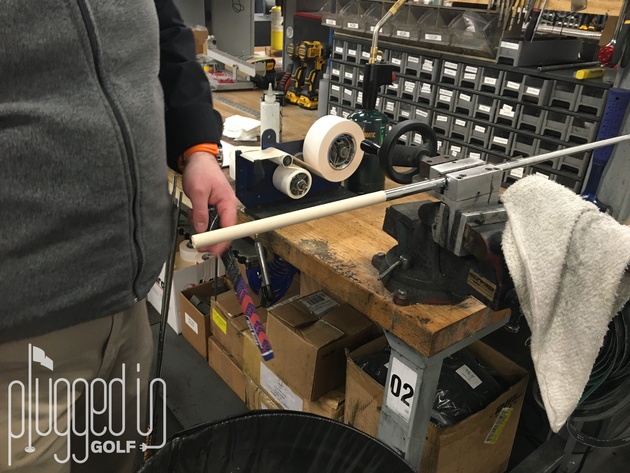
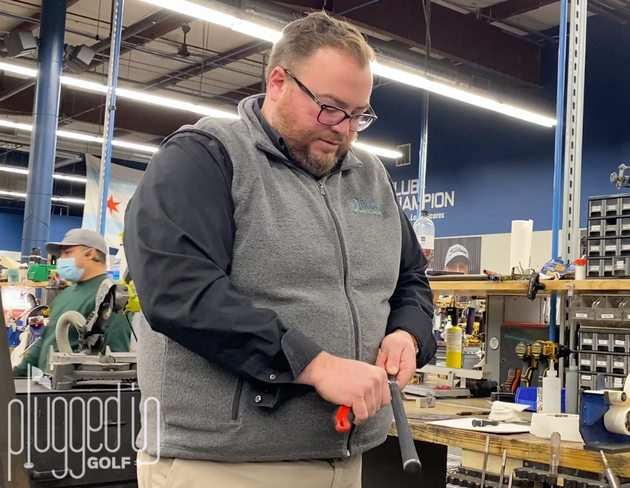
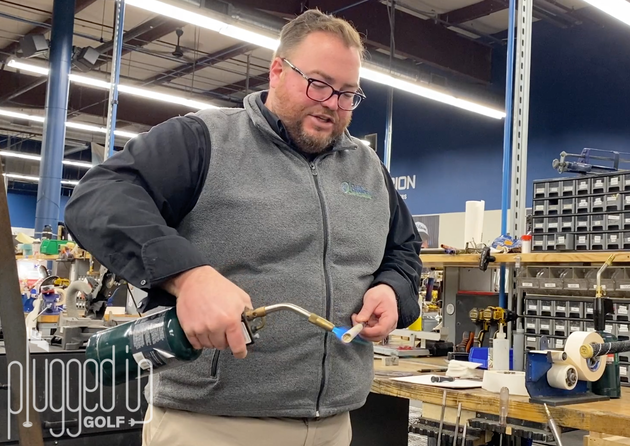
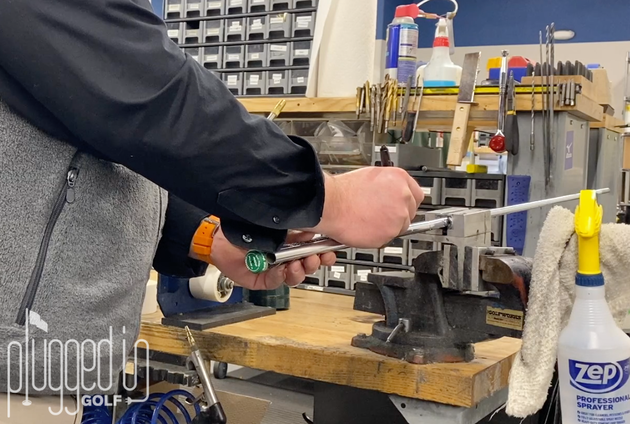
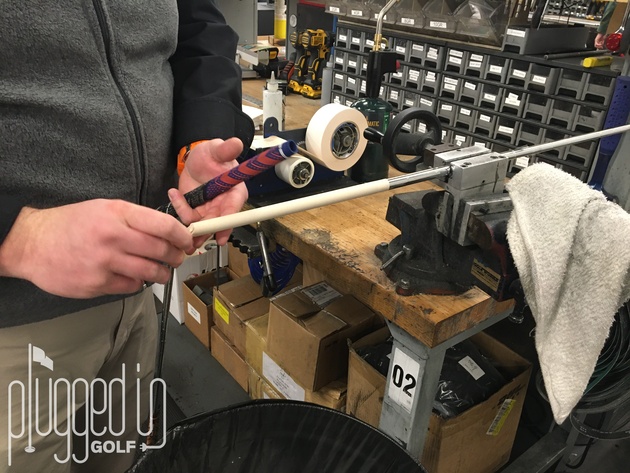
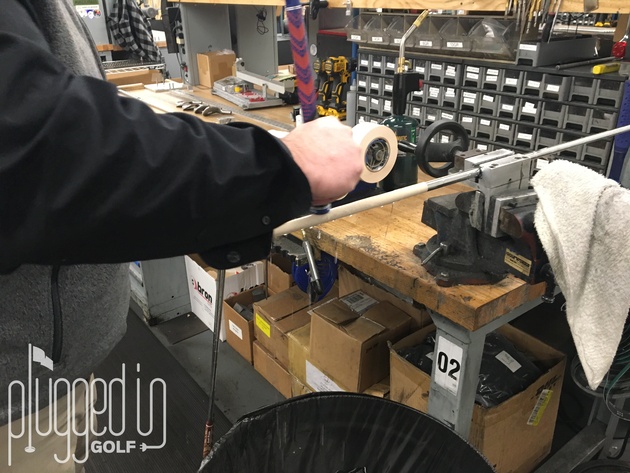
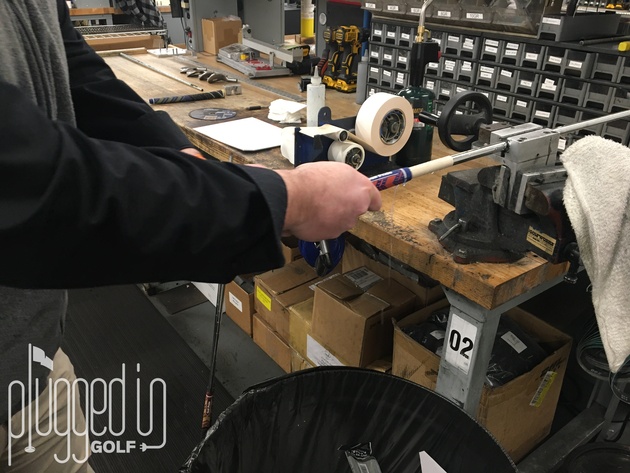
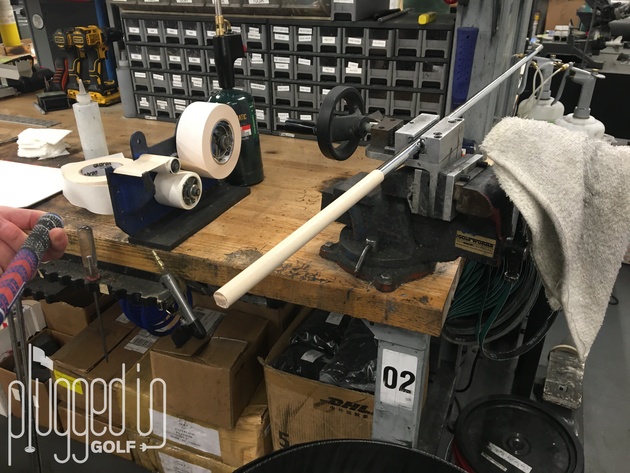
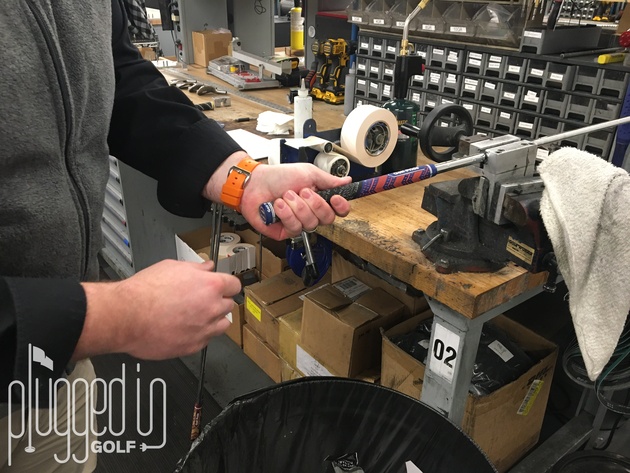












4 Comments
Hello. I enjoyed your demo on grip changing or adding. I do my own tech work. Looking forward to shaft changing especially removing an adapter with heat without destroying it with pressure removal.
I do my own grips without a vice … I would like to learn how to build up a grip with tape.
More serious problem ,Broken metal shaft part stuck rusted in head ,so far used Heat normally enough to slide a bit out NO ,soaked it in solvent NO, and even a drill will not cut it out ? First time ever to have such a problem
When I regrip I put a tee in the hole at the end of the grip rather than hold a finger against it.